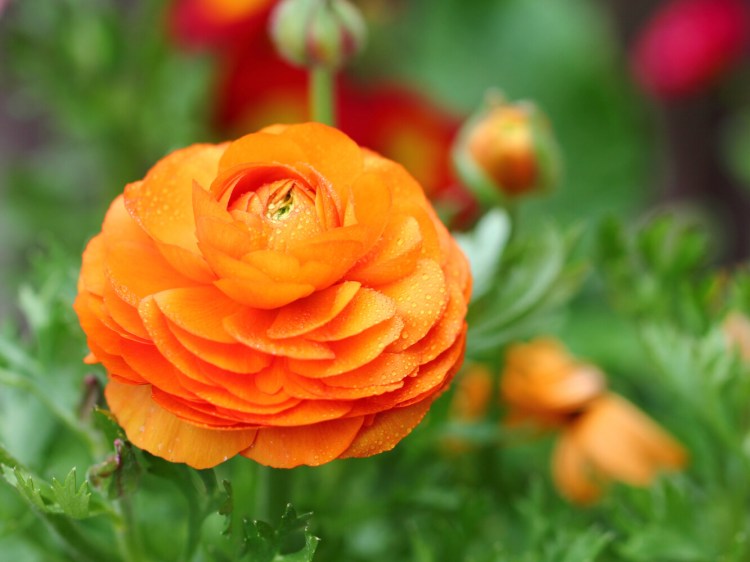It’s time to get ready for the outdoor gardening season. Yes, the tradition in Maine is that the season starts on Patriots Day (April 18 this year), but if you spend the next five weeks reading and worrying about unnerving current events around the world, you will be way behind when it comes time to do some actual gardening.
A few decades ago when we had less money and didn’t take spring vacations, the coming week would be when we set up our seed-starting station and planted pepper seeds. Tomatoes and other vegetables would come later. We don’t do that anymore. We’ve removed the fluorescent light fixtures that used to hang on chains above the ping-pong table we then used as a seedling station. Now, when the teenage grandchildren visit, we actually play table tennis.
But we do still plant things now. My wife, Nancy, is growing ranunculus for the first time because she really liked the ones in the flower arrangement I gave her for Valentine’s. In Zone 7 or above, the ranunculus corms could have been planted outdoors last fall. In the frigid North, the planting is more complicated.
First you must soak the corms, which look like plump claws, in lukewarm water for several hours. After that, put about two inches of commercial potting mix into the bottom of a container, place the corms over the soil, then cover them with more soil by about an inch. Keep them in a cool place until they sprout, then move them to a sunny window. In May, plant them outside.
Nancy, who is a keen recycler, puts moist planting mix in the bottom of one of those big plastic containers that supermarket produce departments use for salad greens, then shuts the lid. In this improvised mini-greenhouse, the corms sprouted quickly. The ranunculus will look gorgeous this summer in what we still call the vegetable garden, joining the dahlias, gladioli, zinnias, tithonia and other flowers there that we bring inside to use in bouquets.

You can see the edge of Atwell’s cold frame here, with a bit of lettuce that escaped its confines last growing season. Photo by Tom Atwell
This is also about the time that, for the past two years, I have planted lettuce in a cold frame (basically a miniature greenhouse) in the vegetable garden. I began the practice in 2020. It was a very warm March, and I was looking for anything to do in the early days of the pandemic. Within just a few weeks, I was cutting young lettuce greens for our table. Last year, I repeated the experiment. I was still getting lettuce in December, when the wind put an end to my project. It blew the top off the cold frame, and the lettuce froze. This year, I may try to get some carrots going, too, to give us more variety in our early spring vegetables.
It’s a good time to check your gardening equipment: Is it clean and in good shape? In previous years, I’d have sharpened all of our pruning saws, hand pruners, loppers and other equipment by now, but this winter I was busy refinishing and reweaving lawn chairs, so the tools are still waiting in a box for the needed maintenance. I’ve finished with the furniture, so plan to get to the tools next.
If I have time, I may try chitting potatoes, which I just heard about this year although I have been growing potatoes for at least 40 years. My method has been to take the seed potatoes – whether ones I’ve saved from the previous year’s crop or seed potatoes we’ve purchased – and cut them up with a couple of potato eyes per piece a day or two before planting them, usually in late April.
Do the same procedure three or four weeks before you plan to plant, and you’ve chit potatoes. During that time, you leave them in a cool but sunny area, letting the eyes sprout and grow. Now, I’ve been pleased with our potato crops in the past, but who knows? Maybe they could be even better. This spring, I hope to do a side-by-side comparison of the two methods.
With a lot of these pre-April chores, the real goal is to convince myself that winter is almost over and that gardening season is coming. That thought improves my mental, and probably physical, health at a time when both could use the boost.
Tom Atwell is a freelance writer gardening in Cape Elizabeth. He can be contacted at: tomatwell@me.com.
Send questions/comments to the editors.



Success. Please wait for the page to reload. If the page does not reload within 5 seconds, please refresh the page.
Enter your email and password to access comments.
Hi, to comment on stories you must . This profile is in addition to your subscription and website login.
Already have a commenting profile? .
Invalid username/password.
Please check your email to confirm and complete your registration.
Only subscribers are eligible to post comments. Please subscribe or login first for digital access. Here’s why.
Use the form below to reset your password. When you've submitted your account email, we will send an email with a reset code.